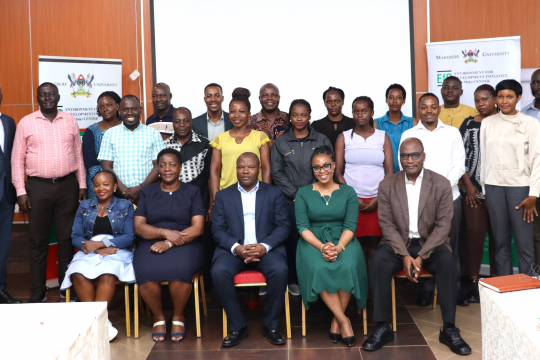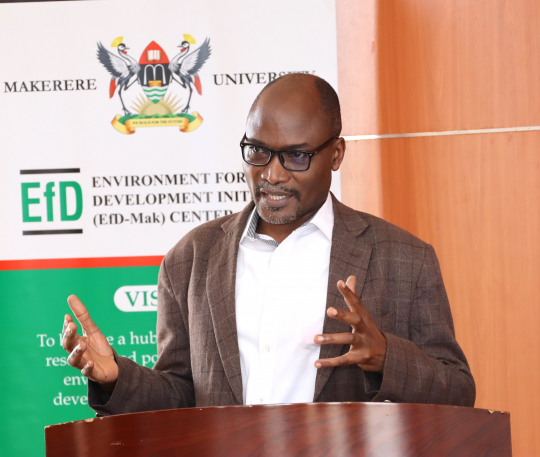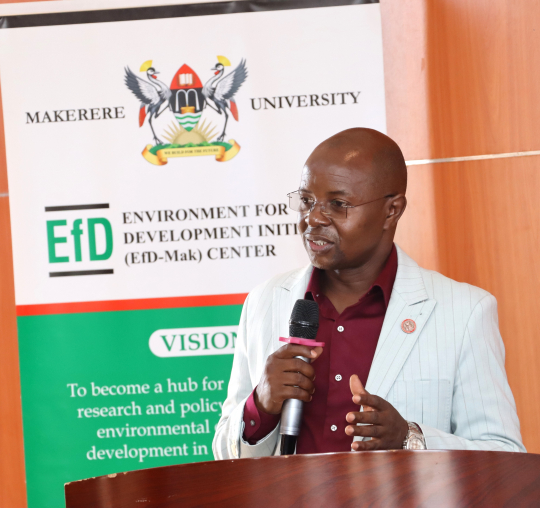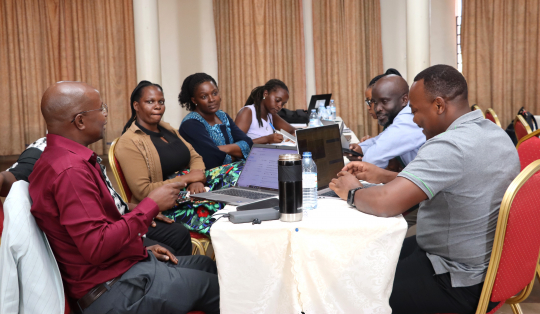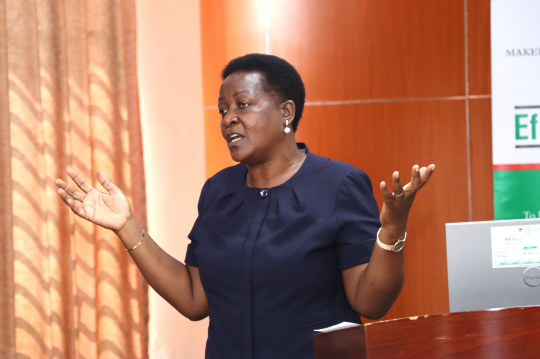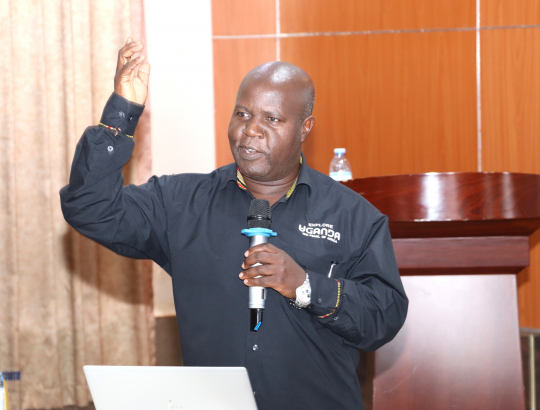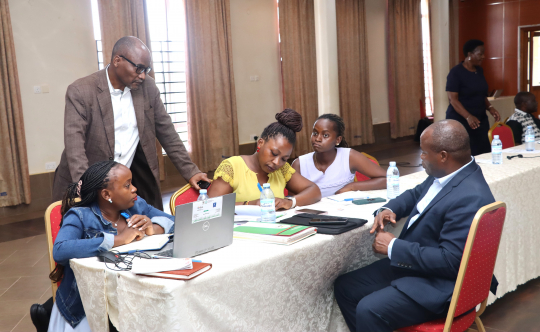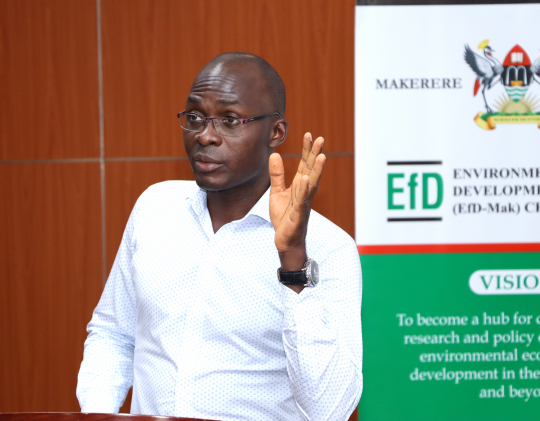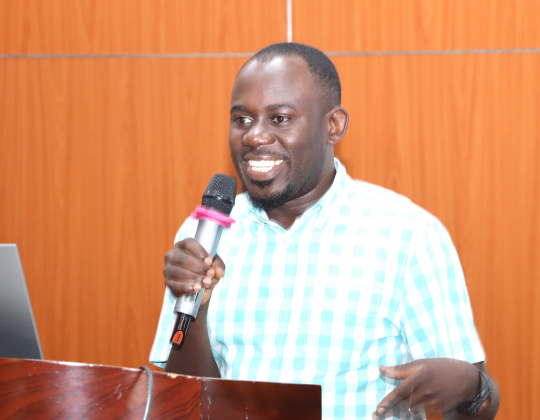Environmental economists and graduate students from Makerere University held a meeting with government officials to identify research and data gaps to address the persistent environmental and natural resources (ENR) challenges in Uganda.
The two-day researchers’ training organized by EfD Uganda was held at Esella Country Hotel in Kampala, on 14th-15th March 2024. The workshop was officially opened by the Principal College of Business and Management Sciences represented by his Deputy Dr. Yawe Bruno.
Local Government (LG) representatives were brought on board to help understand policy research questions in the local government that researchers can leverage to generate evidence to inform policy implementation and improvement in service delivery and environmental protection in general. The District Natural Resources officer, Wakiso district Rebecca Ssabaganzi, was the lead facilitator.
The national policymakers, on the other hand, presented policy-, capacity-, research-, and data gaps that researchers can focus on to improve their work. Ronald Kaggwa from the National Planning Authority facilitated the training.
Center Director Edward Bbaale said the purpose of the workshop was to identify what natural resources and environmental issues are being pitched in National Development Plan (NDP) IV and how Uganda is transiting from NDP III to NDP IV to inform their research.
“This is a great opportunity for our researchers to have a deeper discussion with the local government and national planning authority on critical issues that the government is focusing on so we can ensure that our research is policy-relevant,” said Edward Bbaale.
He urged the government to reduce taxes on renewable energy as a key tool to encourage the public to drop the use of biomass which has negative effects on the environment and human health.
“Transitioning from the dirty sources of energy to the cleaner sources of energy is a very expensive venture and it requires infrastructure investments. We would like to hear about green financing and what the government is planning to do to raise the money,” he inquired.
From the Local government presentation, Ms. Rebecca Ssabaganzi focused on the role of Local Government in the protection of natural resources, the structures, challenges and capacity gaps for research. Ssabaganzi stressed the need to raise public awareness of the sustainable use of the environment and conservation as an obligation for everyone.
She also stressed the need for mindset change for the public to adopt alternative energy sources and invest in eco-tourism as well as the regulation of building substances and valuation as a basis for revenue assessments and best development use.
She explained that poor management of water, environment, and natural resources coupled with the worsening effects of climate change have resulted in high exposure to hazards and disasters, with limited capacity for climate change adaptation and mitigation, low disaster risk planning, and rampant degradation of the environment and natural resources caused by low enforcement capacity.
From the national planning perspective, Ronald Kaggwa highlighted the persistent ENR management challenges inherited from NDPI, II, III to IV.
These included the deteriorating state of the ENR, enforcement and compliance challenges, limited use of economic incentives, and income poverty among the ENR-dependent populations.
Kaggwa also reported that there is low value-addition to ENR, excessive reliance on the market prices to make major decisions, and challenges to balance the benefits and real costs of natural resource conservation.
Kaggwa proposed some thematic areas for research to inform policy. These included reviewing policy, legal, and institutional frameworks for effective ENR governance and management, reviewing the effectiveness and efficiency of the program approach to ENR governance, and the likely impacts of the rationalization of ENR institutions on performance.
Other research areas proposed are coordination, regulation, and monitoring of ENR management at LG and national levels, exploring the feasibility of economic instruments for ENR management and the public good and transboundary nature of ENRs and governance challenges.
Key takeaways from the workshop
From the presentations and discussion groups, the meeting agreed on key thematic areas for research including valuation of existing resources, appropriate mix of policies, stocktaking of existing data and the role of decentralization in protecting the environment.
Other proposed research areas were climate financing and transitioning to a low-carbon economy, cost-benefit analysis for an energy transition and climate change and its effects.
The meeting also resolved to strengthen collaborations between Makerere University's existing projects, government ministries, departments and agencies, development partners and international agencies, financial institutions, and civil society organizations.
EfD-Mak to prepare research proposals and tailored courses
Uganda’s IGE policy engagement specialist Peter Babyenda said the meeting identified the capacity gaps in local governments that the center can fill, by preparing tailored courses to address gaps. The courses would entail training local government workers in data collection, evaluation of natural resources, stakeholder engagement, mindset change, and feasibility studies.
For the researchers, the meeting informed them where they are needed and their role at a national level.
“We are preparing our research proposals to have multidisciplinary research projects, which means, we need sociologists, accountants, statisticians for data collection, etc. but also, a partnership between academia and policymakers,” Peter Babyenda said.
The center will build on key issues generated from the meeting.
By:
Jane Anyango
Communication Officer.
